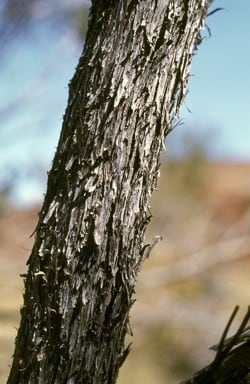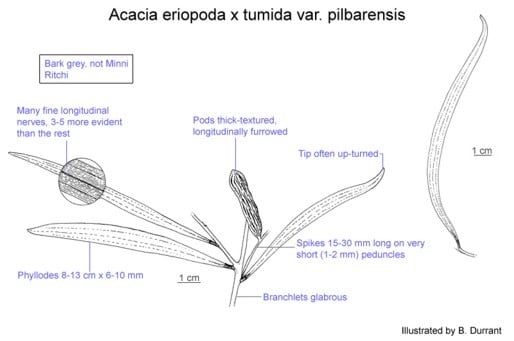Acacia eriopoda Maiden & Blakely x Acacia tumida var. pilbarensis M.W.McDonald
WATTLE
Acacias of Australia
Family
Fabaceae
Distribution
Known only from Pilbara region in north-western W.A. where it is occurs in a few populations just N of Nullagine.
Description
Shrub 2–3.5 m high. Bark grey, longitudinally fissured. Branchlets glabrous. Phyllodes narrowly oblong elliptic to narrowly oblong oblanceolate, sometimes dimidiate, straight to falcate, narrowed at both ends, the apex with a small thickened point and often up-turned, 8–13 cm long, (5–) 6–10 mm wide, glabrous; longitudinal nerves numerous, fine, with 3–5 slightly more evident than the rest (central nerve the most prominent), minor nerves very close together (to c. 0.1 mm apart). Inflorescences mostly simple; peduncles 1–2 mm long, with sparse to moderately dense, spreading to ±appressed hairs; spikes 15–30 mm long, golden; receptacle glabrous. Flowers 5-merous; calyx shortly dissected, calyx tube densely hairy. Pods narrowly oblong to submoniliform, compressed to sub-terete, 3–5 cm long, 4–4.5 mm wide, coriaceous, longitudinally furrowed, glabrous, greyish brown. Seeds longitudinal, oblong to elliptic, 4–5 mm long, dark brown; inner pleurogram ‘u’-shaped and c. 0.4 mm long, outer pleurogram c. 1 mm long; funicle/aril dull pale yellow when dry (?white when fresh).
Phenology
Flowering commences in May (but not known when it ends).
Habitat
Grows on low rocky hills in light orange-brown sand (pH 8.5), often along drainage lines.
Specimens
W.A.: 29 km N of Nullagine on Great Northern Hwy, B.R.Maslin 4954 (BRI, MEL, PERTH).
Notes
The hybrid status of this entity is based on field observations and morphology of specimens examined (the phyllodes are intermediate in width between the two putative parents). Of the two populations examined both putative parents occurred in one of them, but only A. eriopoda was found in the other (although A. tumida var. pilbarensis was common in the general area). This hybrid is similar to some forms of A. trachycarpa ´ tumida var. pilbarensis which also occurs N of Nullagine but which is distinguished by having pseudo ‘Minni Ritchi’ bark and phyllodes with upper margin broader than the lower margin (margins equal in A. eriopoda ´ tumida var. pilbarensis) and nerves more widely spaced. See B.R.Maslin et al., Wattles of the Pilbara CD-ROM (2010), for further discussion.
FOA Reference
Flora of Australia Project
Author
B.R.Maslin
This identification key and fact sheets are available as a mobile application:
URL: https://apps.lucidcentral.org/wattle/
© Copyright 2018. All rights reserved.







